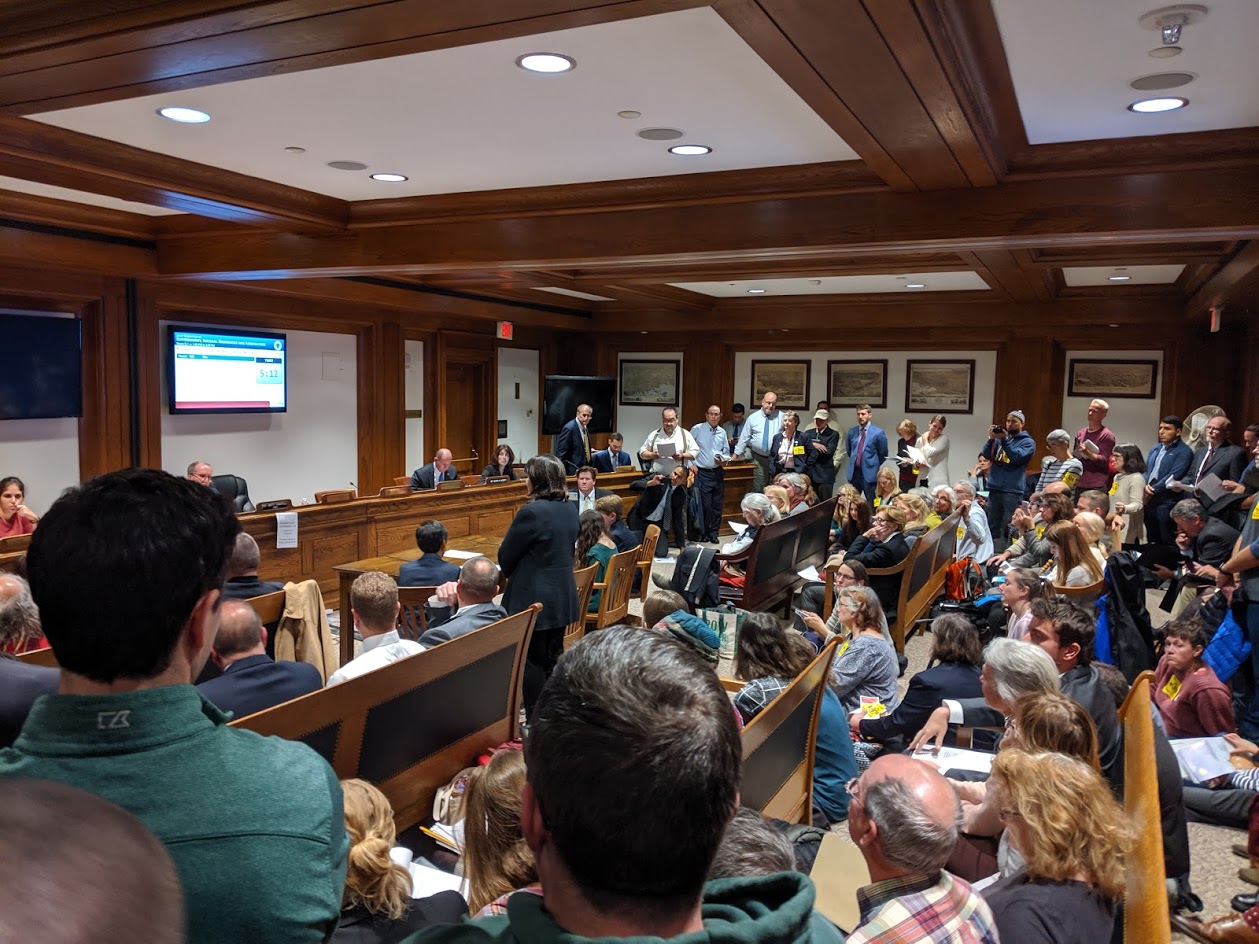19
Nov
In the Fight to Protect Pollinators, New Hampshire Pollinator Bill Stalls as Massachusetts Advocates Gear Up
 (Beyond Pesticides, November 19, 2019) Legislatures in two New England states continue to deliberate environmental and public health measures aimed at protecting pollinators, safeguarding schoolchildren, and eliminating toxic pesticides. In Massachusetts, dozens of advocates packed a crowded hearing room for a slate of 16 bills before the Joint Committee on Environment, Natural Resources and Agriculture. In New Hampshire, advocates were dismayed that, after a successful vote in subcommittee, the House Environment and Agriculture committee voted to weaken HB646, the Saving New Hampshire’s Pollinators Act, into an interim study measure.
(Beyond Pesticides, November 19, 2019) Legislatures in two New England states continue to deliberate environmental and public health measures aimed at protecting pollinators, safeguarding schoolchildren, and eliminating toxic pesticides. In Massachusetts, dozens of advocates packed a crowded hearing room for a slate of 16 bills before the Joint Committee on Environment, Natural Resources and Agriculture. In New Hampshire, advocates were dismayed that, after a successful vote in subcommittee, the House Environment and Agriculture committee voted to weaken HB646, the Saving New Hampshire’s Pollinators Act, into an interim study measure.
The stalling of NH’s HB646 came as the pesticide industry, state agencies, and the state agricultural commissioner placed significant pressure on lawmakers, forwarding the idea that the science on the dangers neonicotinoids pose to pollinators is too complex for lawmakers to understand. Local advocate Fawn Gaudet of Save Our NH Pollinator Coalition responded with a passionate, science-based editorial in the Concord Monitor underlining the need for urgent action. However, arguments from pesticide industry proponents sowed the seeds of doubt, deferring to the current Environmental Protection Agency, despite its repeated failures to step up and protect pollinators.
An amendment weakening the legislation was introduced by State Representative Peter Bixby (D-Strafford), but not strongly supported by the member, according to those in attendance. Ultimately, committee Chair Representative Amanda Gourgue (D-Strafford), Representative Sherry Dutzy (D-Hillsborough), and Republican members of the committee voted to knock the bill down into an interim study measure. Although advocates are disappointed that the Chair and the committee did not take immediate action to protect pollinators, they remain committed to continue educating lawmakers and the public about the hazards of bee-toxic pesticides.
“Scientific research continues to show the harm of neonics and other bee-toxic pesticides to our ecosystems, wildlife, and humans,” said Diana Carpinone of Non-toxic Dover NH. “These poisons make pollinators more vulnerable to other threats like mites and diseases. Establishment of more habitat and forage for pollinators is very important, but those plants must be free of toxic chemicals so as not to defeat the purpose. Restricting the use of bee-toxic pesticides is a vital step in protecting our New Hampshire pollinators.”
In Massachusetts, advocates made a strong push against industry influence after experiencing a situation similar to New Hampshire’s during previous legislative sessions. Packing the hearing room were a range of local, state, regional and national advocates pushing for bills that would restore local authority, protect schoolchildren from toxic exposure, and enact long-awaited pollinator protections. Many focused on the importance of fostering healthy soil as a means of best addressing pest problems and protecting the environment. “Herbicides kill the soil life,” said Julie Rawson, executive director of the Massachusetts chapter of the Northeast Organic Farming Association, which helped turn out advocates. “In order for plants to photosynthesize, we need soil microorganisms. … The pesticides kill all of those microorganisms and then the soil becomes dead, (leading to) problems with runoff (and) erosion.”
Testimony during the hearing lasted over four hours, with the number of local advocates overwhelming the handful of industry voices that attended in opposition. The slate of bills now rests in the hands of the committee. It is still accepting testimony as it deliberates, and Massachusetts’s residents can send a letter in support through this link. New Hampshire residents are encouraged to sign in support of a petition urging pollinator protection and follow up with a phone call to their individual elected officials.
If you’re interested in joining other advocates in protecting public health and the environment from toxic pesticides in your community or state, reach out to Beyond Pesticides at 202-543-5450 or [email protected].
All unattributed positions and opinions in this piece are those of Beyond Pesticides.
Source: Daily Hampshire Gazette, Concord Monitor










